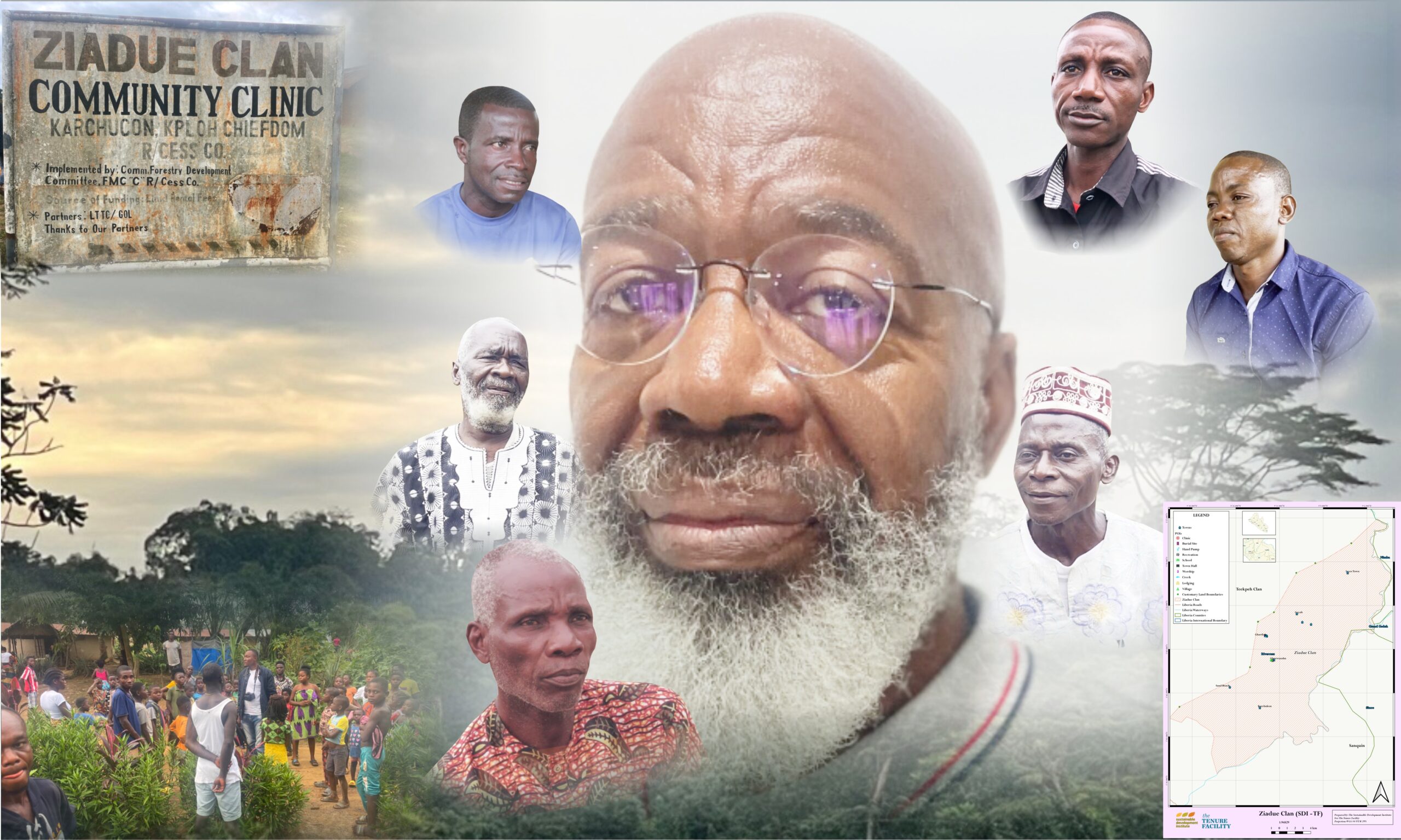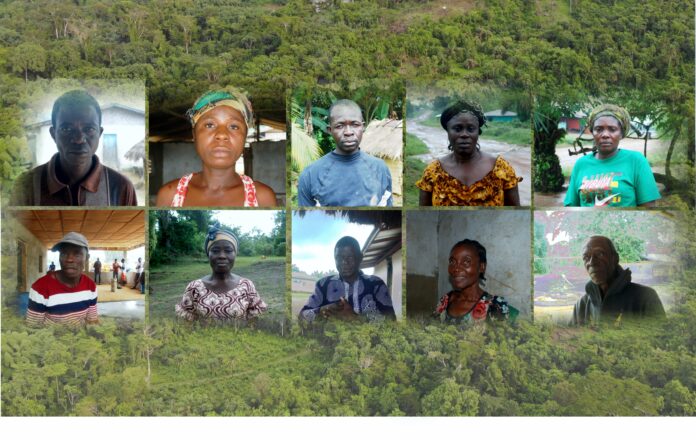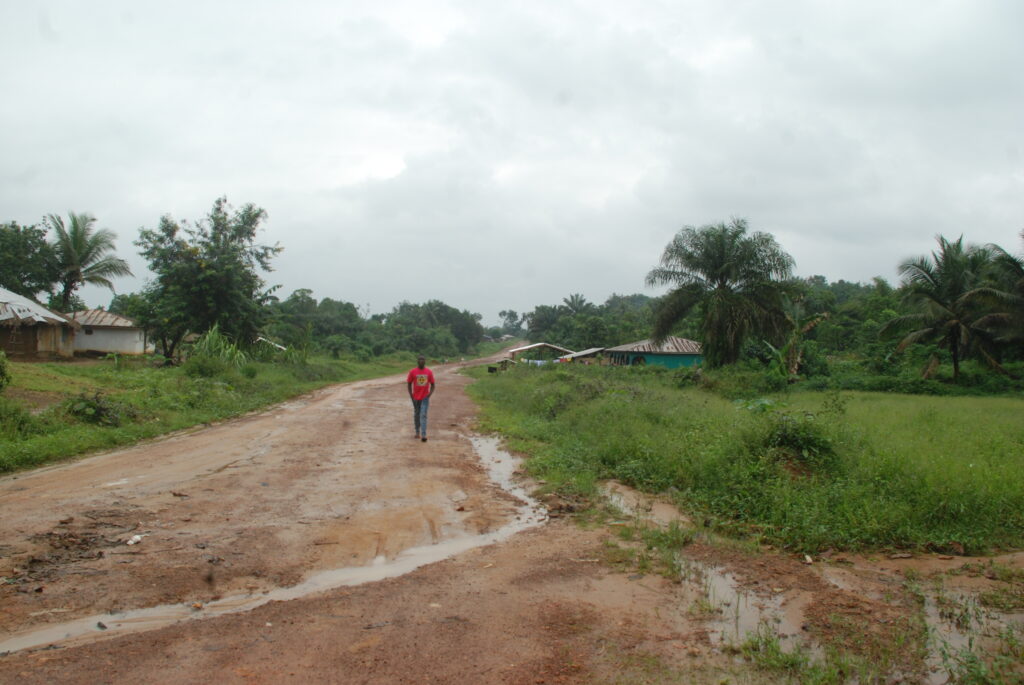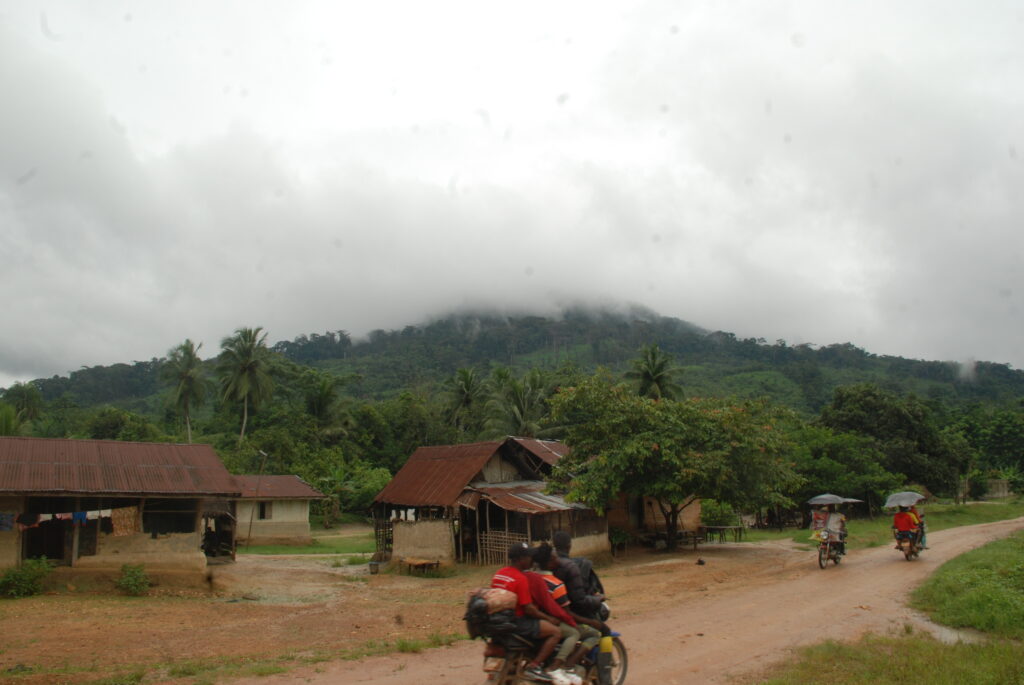Top: A graphic depicting BlueEarth Capital’s CEO Augustine Jarrett and townsmen of Ziadue Clan. The DayLight /Rebazar Forte
By Esau J. Farr
- BlueEarth Capital, a company seeking a carbon contract with Ziadue Clan, River Cess, gave locals money ahead of an agreement, undermining villagers’ right to free, prior and informed consent.
- The proposed agreement targets over 55,000 hectares of forest, more than Ziadue’s uncontracted forest area
- Liberia has no laws or policies for carbon trading, and the duration of the proposed deal is not backed by existing laws
- Many townspeople The DayLight interviewed said they were not aware of a proposed contract with the company, another red flag.
- Locals expressed concern over BlueEarth’s lack of expertise in the emerging carbon credit market and are uncertain about their fair share of benefits
ZIADUE CLAN – The ongoing negotiation between the Liberian government and the UAE-based Blue Carbon would affect parts of River Cess. But a community in the southcentral county is negotiating its own carbon agreement with another company—and under similar controversial circumstances.
Ziadue, located in the Central River Cess District, is negotiating a carbon credit memorandum of understanding (MoU) with BlueEarth Capital, an American-owned company. The parties had earlier signed a letter of intent. The company wants to harvest carbon from over 52,000 hectares of forest and trade the carbon credits it obtains on the international carbon market.
But BlueEarth Capital has been providing food and transportation fares for community leaders reviewing the agreement, according to the company itself and townspeople. Recently, the company gave the community cash for the same purpose.
“We hosted a meeting to view this thing (draft agreement) that they brought here… So, they sponsored the meeting that time,” said Emmanuel Roberts, the chairman of the Ziadue’s community land development and management committee. Under the Land Rights Act, the CLDMC, which comprises locals from towns and villages, represents customary communities in land matters.
Roberts claimed that BlueEarth provided about L$25,000 for a recent meeting in a town called Gbardiah he used to buy food and reimbursed attendees’ transportation fares.
Friday Wesseh, the treasurer of the CLDMC, told The DayLight Roberts informed him that BlueEarth had sent him US$10 but had yet to receive it. Roberts denied that claim, saying he had only promised Wesseh on his own accord.
“Even though Wesseh did not attend the meeting in Gbardiah, being a CLDMC leader, I decided to give him something from my pocket,” Roberts told The DayLight in a phone interview.
BlueEarth’s payments to local has undermined the principle of free, prior and informed consent (FPIC), a right granted to rural people in the Land Rights Act and the Community Rights Law… The word “free” in FPIC means void of intimidation, coercion or manipulation.
Augustine Jarrett, BlueEarth’s sole owner said the payments were not meant to influence villagers. Jarrett said the payments were part of a tradition for people seeking to work with communities.
“We did facilitate bringing people to areas… We don’t expect them to come with their lunches…,” Jarrett told The DayLight in an interview at his Tweh Farm office outside Monrovia. “We are not attempting to induce anybody to do anything they are unwilling to do.”
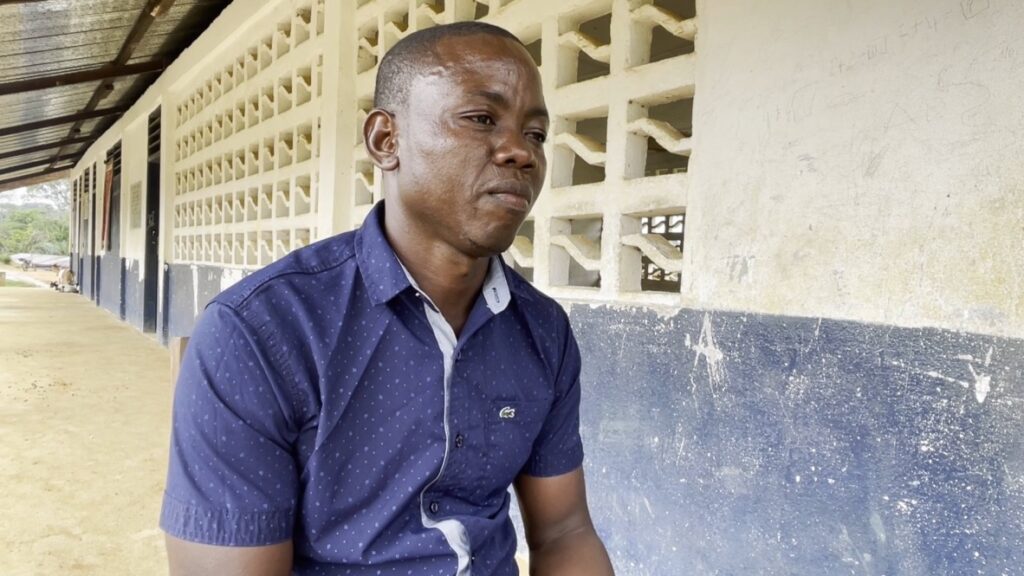
But Jarrett’s claims are not backed by facts. Companies underwrite expenses for communities’ meetings It is true in forestry. However, that happens in cases where such payments are captured in an existing agreement, and not an FPIC engagement.
BlueEarth’s proposed MoU also flouts the FPIC standards in other ways. Ziadue and BlueEarth have been negotiating the deal since February but many townspeople said they were unaware of it. Only three out of 40 CLDMC members had signed the letter of intent, the document shows.
“That’s my first time hearing about it,” said Patience Smith a member of the CLDMC.
“The one I know about is… [the logging company],” added Betty Gaywea, a women leader. She was referencing EJ&J Logging Company which works in Ziadue.
In order for a community to give its consent, all of its representatives must have their say through a transparent process. That is according to the UN’s Declaration on the Rights of Indigenous Peoples, which Liberia has ratified, and Liberia’s own FPIC Policy.
Jarrett claimed his company respected FPIC and would get the community’s general consent in time. He wrongly claimed that FPIC “continues over the entire life of the project.” Actually, FPIC must occur prior to the approval or commencement of a project, according to the United Nations.
‘Not a forestry company’
BlueEarth eyes a 25-year contract with Ziadue, subject to a 10-year review. Those timeframes go against the Community Rights Law of 2009 with Respect to Forest Lands. The law sets a 15-year ceiling for community forest-related contracts, with a five-year review period.
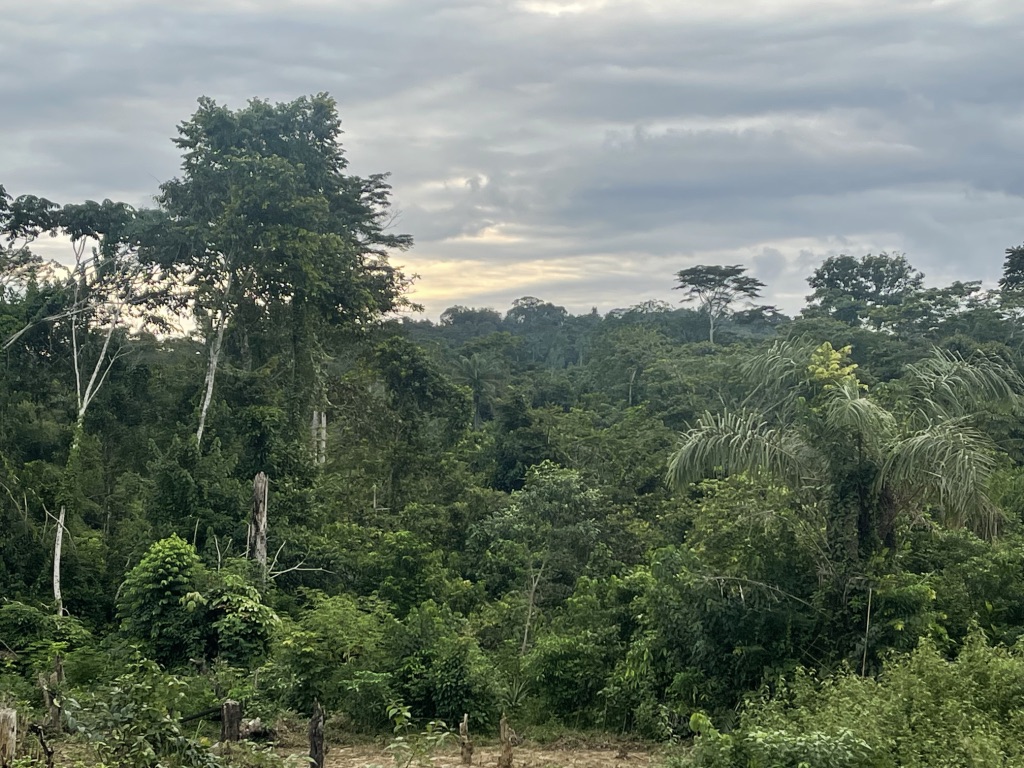
Jarrett said BlueEarth’s proposed MoU was not a forestry contract, so, 15 years was not attractive enough for investors.
“How can I ask a person to invest in Liberia’s forest conservation if we can’t guarantee that we are going to conserve the forest over the next… 30 years?” Jarrett said.
“We are not regulated under the forestry law, we are not a forest company and we are not going to extract forestry assets,” he added.
Those points are largely misleading. While Liberia does not have any specific legal framework on carbon credits, the emerging industry is more related to forestry than other sectors. The Forestry Development Authority (FDA) is playing a key role in the negotiation between Liberia and the UAE-based Blue Carbon. The FDA has also added carbon credits to its communities, conservation and commercial pillars. Liberia’s first-known carbon negotiation about 15 years ago targeted 400,000 hectares, the maximum under the National Forestry Reform Law.
The size of the forest is another issue. BlueEarth’s MoU targets 55,123 hectares of forestland but Ziadue does not have such land area to lease. Ziadue’s uncontracted forest covers only 47,000 hectares, according to BlueEarth. That is 8,000 hectares less than BlueEarth’s target.
Moreover, that 47,000 hectares is questionable. Blatoe, a town arguably in Ziadue across the Cestos River, has a boundary issue with a town in the neighboring Beaworn Clan. That problem has stalled Ziadue’s quest to acquire its ancestral deed, a journey the clan started in 2020. (Under the Land Rights Act, a community must resolve its border issues before the government surveys its lands and gives its deed)
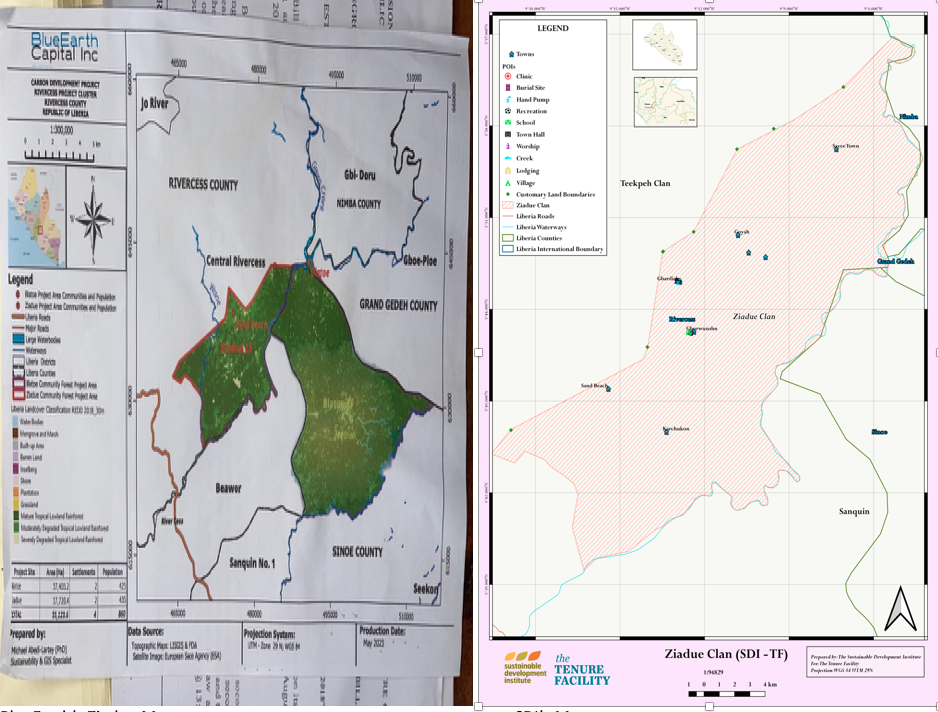
Early last month, monitors of the Liberia Land Authority (LLA) found Ziadue was unready for an official survey, a requirement for the issuance of the document. This week, the Sustainable Development Institute (SDI), which is assisting with Ziadue in getting its deed, told The DayLight that the Blatoe issue had been resolved. However, LLA did not confirm the information.
Jarrett declined to comment on that matter.
‘Think carefully’
Locals have consulted SDI on the proposed MoU.
“We are waiting on our consultants for advice before we accept or reject BlueEarth,” said Samuel Morris, a member of Ziadue’s CLDMC. “For me, I am not yet encouraged whether BlueEarth is a good company or not because I do not know anything about carbon.”
Elijah Garsuah, the acting clan chief of Ziadue, even feared BlueEarth Capital would end up like EJ&J Logging Company. The firm contracted a portion of the forest Ziadue shares with its neighbor, the Ziadue and Teekpeh Community Forest in 2018 and did not live up to the agreement. In fact, the leadership of the community forest has resolved to cancel its agreement.
Under the MoU, BlueEarth will pay land rental fees of US$82,684 for a one-year feasibility study at US$1.50 per hectare.
After that period, the company will pay Ziadue 10 percent of the total sales of carbon credits on the voluntary carbon market, according to the document. Companies trade carbon credits to other companies that want to offset their carbon emissions on the voluntary carbon market.
Critics say Liberia does not have the expertise and laws to regulate such a complex industry.
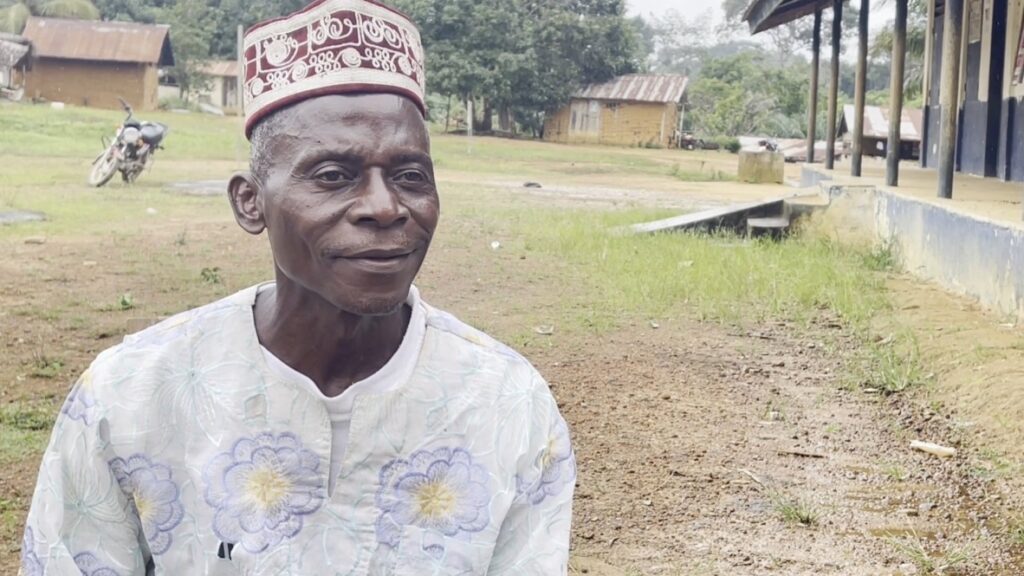
BlueEarth was founded in February last year, with Jarrett as its sole American owner, according to the company’s article of incorporation. Jarrett was the chief finance officer of Liberia Wood Industry, a parent company of International Consultant Capital (ICC), which holds a logging contract for forest in River Cess and Nimba. However, he does not have any experience in carbon trading.
SDI said it was analyzing the proposed MoU and had observed that the proposed 10 percent share for Ziadue from potentially generated revenue from the carbon project in the agreement is not fair to the community.
“We advise the community to think carefully before signing this deal,” said Nora Bowier, the coordinator of SDI’s land rights program.
“We know that development opportunities are crucial for these communities but proper due diligence is necessary to ensure that communities do not make the same mistakes of the past by signing agreements with companies that had no capacity to deliver.”
[Aaron Geezay contributed to this report]

